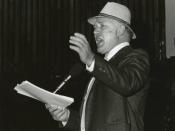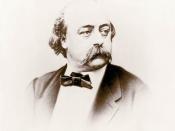What is truth? This is a question that has been pondered upon by philosophers throughout the ages. Gustave Flaubert once said: " There is no truth, there is only perception". This point of view can easily be defended but, on such a vast subject, one must dig deeper into the question to find the answer. On a problem such as this, there may be many truths applicable to different situations and circumstances. Are all truths based solely upon one's perception of the actions around him or are there some universal truths that are valid in every situation? In the novel One Flew Over the Cuckoo's Nest, the theme of truth is explored and corresponds well, for the most part, to Gustave Flaubert's hypothesis; that truth is in the eye of the beholder.
Society has always imposed truths by enacting laws or via popular opinions. These truths, known as doxas or unwritten laws have such a bearing on how people think that they actually define how one may act towards someone who does not conform to them.
Regardless of whether one has experienced these "differences" in the way an other leads their life, we are all inclined to follow the doxa, to agree with it and therefore support it. Society enforces these rules by excluding those who do not follow them and such is the case in One Flew Over the Cuckoo's Nest. The characters of this novel are barred from society for this precise reason.
However truths change and consequently, cannot be applied to each and every generation. Most scientific advances have been achieved by throwing out these so-called "truths", which allowed new ones to be established. The Chief in this novel has encountered people that base their actions on truths that no longer apply. "They don't come...



The essay
this essay shows originallity but it doesn't have a tight structre and clear statements. If you follow the Statement Explanation and Example . You also dint address the topic and argument(the are totally unlinked!!!!!!!!
0 out of 0 people found this comment useful.